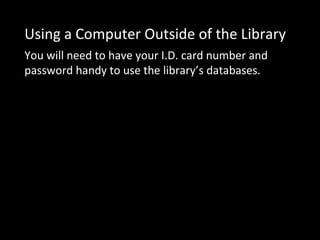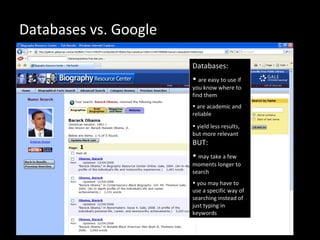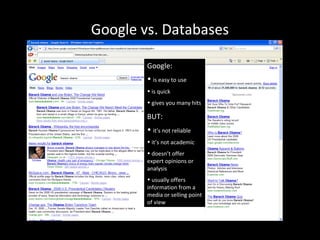Steps to powerful research
- 1. Steps to Powerful Research . Halfway Point christopher baker musicstudentinfo.com For middle and high school students
- 2. Step 1: Decide and Develop • What is the subject of your research? • For ideas on current issues, visit our library’s database. • A subject is broad and general. • A topic is narrow and specific.
- 3. Step 2: Ask Learning Centre Staff for Help • Phone • Email • Peter Bicknell • Highly Skilled In person at the reference desk…
- 4. Step 3: Gather Background Information Pick up an encyclopedia and read about basic information on your topic. If the topic is too specific, read about the subject. Read On... If there are any good suggestions of books at the end of the encyclopedia article, note those to look up later.
- 5. Using a Computer Outside of the Library You will need to have your I.D. card number and password handy to use the library’s databases.
- 6. • There are a couple of ways to search our library databases. – By subject – The A to Z index Step 4: Use Library Databases and Search for Supporting Websites data·base: noun 1. A collection of data arranged for ease and speed of search and retrieval.
- 7. Step 5: Find Books on your Topic Use the library’s online catalog to find books or media on your topic.
- 8. Step 6: Find Magazine Articles • Use the LC’s databases that are magazine indexes (usually yields good results, with full text magazines available online) • Browsing through the collection of magazines (much harder to do!)
- 9. Doing a Boolean Search The word “abolish” is an example of a strong search term. A phrase such as “do away with” instead of “abolish” is weaker and will yield fewer results. Be sure to ask a library staff person for help if you are not getting any successful results.
- 10. What is “Boolean” searching? Use of “quotation marks” Phrases must be put inside quotation marks. Like “electoral college” or “energy drinks” or “University of Louisville” Excluding terms -word A topic narrowed down to eliminate a lot of hits (number of magazine articles in your result list) you don’t need: dogs –poodles. That will remove all articles with the dogs that mention poodles. OR allows more than one term Dogs OR cats will yield results of articles that mention either dogs OR cats (huge hit list). AND (usually default for terms) Is the small overlap of both terms Dogs AND cats will yield results of articles where the two terms are both mentioned in the same article (smaller hit list)
- 11. Databases vs. Google Databases: • are easy to use if you know where to find them • are academic and reliable • yield less results, but more relevant BUT: • may take a few moments longer to search • you may have to use a specific way of searching instead of just typing in keywords
- 12. Research Databases •The LEARNING CENTRE subscribes to many databases. •These databases are not available by just searching the web. •We have selected and paid for them just like we do books or magazines in our library’s material collection.
- 13. Google vs. Databases Google: • is easy to use • is quick • gives you many hits BUT: • it’s not reliable • it’s not academic • doesn’t offer expert opinions or analysis • usually offers information from a media or selling point of view
- 14. Is this website real? Who? Beware of Web sites that don't let you know who has written them or what their qualifications are! Look at the URL (address) to get more information about the authors of your Web site. Web sites from universities end with .edu. When? Does the Web site say when it was last updated? Is the information old or new? How much does that matter for your research project? Are the links to other sites still working? What? What is the goal of the Web site? What is the viewpoint? Is it to give people facts, or is it trying to sell something? Is the Web site made to inform? Is it made to persuade? Or is it made to make you laugh? Sometimes Web authors make sites with completely incorrect information as a joke! Where? Most authors of good Web sites will tell you where they got their information. Did they do their own research? Did they read books, magazines or newspapers? Do they give you a bibliography (list) of the sources they used? Is the Web site written by an organization that is famous for their research (like a medical school or a science organization)? Beware of authors that don't tell you where they got their information. Why? Does it answer your questions? Does it help you write your report?
- 15. STEP 7: Cite your Sources Need a bibliography or citations for your research? • Most databases have a citation generator on each article for easy citing for your research paper bibliographies. •They can be found at the beginning or end of an article. • If your source does not automatically create a citation, you can find online generators at http://citationcenter.net/ctool.php5
- 16. More on citations… • TIP: Keep up with your citation list as you examine databases, books and websites; make sure you record each citation for easy bibliography making later.
- 17. Bibliographies and beyond… • A bibliography is usually found at the end of your research paper, but you may get asked for it prior to when your assignment is due. • An annotated bibliography is a list of citations to books, articles, and documents. After each citation, you write a brief summary about how relevant and accurate you thought the material was and your opinion on the quality of the works cited.
Editor's Notes
- #3: Once you have your subject picked out, narrow it down into a topic you’d like to research. Sometimes asking a question about your subject will help you decide on a topic. For example, if your subject is “voting,” then perhaps your topic question could be “should the electoral college be abolished in U.S. elections?” The topic of the research then becomes “the electoral college.”
- #4: Finding the “strong” search terms can be difficult. Library staff can help you find magazine articles, books and databases that will help you receive the best information. Librarians can help you examine websites to find the valid ones and weed out the “hack” sites to find the most accurate information. Many times, books and websites are found in many different places in the library or on the web; we can help direct you to materials that will help in your research.
- #5: Get Basic Info: If you are at the library, pick up an encyclopedia and read about basic information on your topic. If the topic is too specific, read about the subject. Read On... If there are any good suggestions of books at the end of the encyclopedia article, note those to look up later. The next few slides will show you some different ways to find background information on your topic at our library’s website.
- #6: If you are at a computer outside of the library, you need to have your library card number and password handy to use the databases…
- #7: The definition of database being “arranged for ease and speed of search and retrieval” is what distinguishes it from the Internet…which is not organized in any standardized method. Databases sometimes can be used like the Intranet, but the information you find on a database are not accessible through search engines like Google or Yahoo! Most are available only through subscription, or with a fee. The cost of databases are paid by the library, and you are allowed to access them without any charges with your library card. Google and Yahoo! (or other Internet searching engines) create their own databases of websites and organize them by subject (the “browse” feature).
- #10: The word “abolish” is an example of a strong search term. A phrase such as “do away with” instead of “abolish” is weaker and will yield fewer results. Sometimes it takes a few tries to get the search phrases worded just the way the computer wants them. Be sure to ask a library staff person for help if you are not getting any successful results.
- #12: Looking at the sources here, most of them are from scholarly sources that concentrate mainly on providing information about famous and important figures in the world. Most likely, you will need to look at just one or two of these hits to find all the information you need for writing information about Obama’s formative years, career in politics and his interests. While some of the entries might be listed as published several years ago, all of them have been updated with current information.
- #13: The library subscribes to over 60 databases. These databases are not available by just searching the web. We have selected and paid for them just like we do books or magazines in our library’s material collection.
- #14: Most of the hits from this search looking for biographical information on Barack Obama are either from the campaign organizations, wikipedia, or from media sources. While none of these sources are “bad” they are not what you want to look at to find an unbiased description of Obama’s life history.
- #15: The Five W's WHO: Look at the author of your Web site. Is it by a famous, well-respected organization like UC Berkeley, or the US Government? Web sites that have good authors don't try to hide this fact. Is the author Joe Blow from Anytown, USA? Is no author even listed? Beware of Web sites that don't let you know who has written them or what their qualifications are! Look at the URL (address) to get more information about the authors of your Web site. Web sites from universities end with .edu. US Government sites end with .gov. Personal Web sites or company Web sites usually end in .com. Organizations (like the Sierra Club, or the San Francisco Public Library) usually end in .org. WHEN: Look at the date of your Web site. When was the Web site created? Does the Web site say when it was last updated? Is the information old or new? How much does that matter for your research project? Are the links to other sites still working? If they're not, you can guess that the author is not working on this Web page anymore and the rest of the information might be out of date, too. WHAT: What is the goal of the Web site? What is the viewpoint? Is it to give people facts, or is it trying to sell something? Is the Web site made to inform? Is it made to persuade? Or is it made to make you laugh? Sometimes Web authors make sites with completely incorrect information as a joke! Many Web sites are trying to sell you a trip to the Bahamas, or some new medicine. Is the Web site you're looking at made to help people do research or talk them into buying something? WHERE: Where does the information come from? Most authors of good Web sites will tell you where they got their information. Did they do their own research? Did they read books, magazines or newspapers? Do they give you a bibliography (list) of the sources they used? Is the Web site written by an organization that is famous for their research (like a medical school or a science organization)? Beware of authors that don't tell you where they got their information. WHY: Why is this information useful to you? Does it answer your questions? Does it help you write your report? Or is the information not really related to your research? The best information in the world is not useful if it doesn't answer the questions that YOU have. Maybe you need to look for another site that discusses what you are looking for. Finally, remember that ALL the information you may need is not on the Web. Ask your librarian to help you find the best information that will work for your research. Inspired by the work of Kathy Schrock. For more information about Web site evaluation, see her Web site at: http://discoveryschool.com/schrockguide/eval.html

















